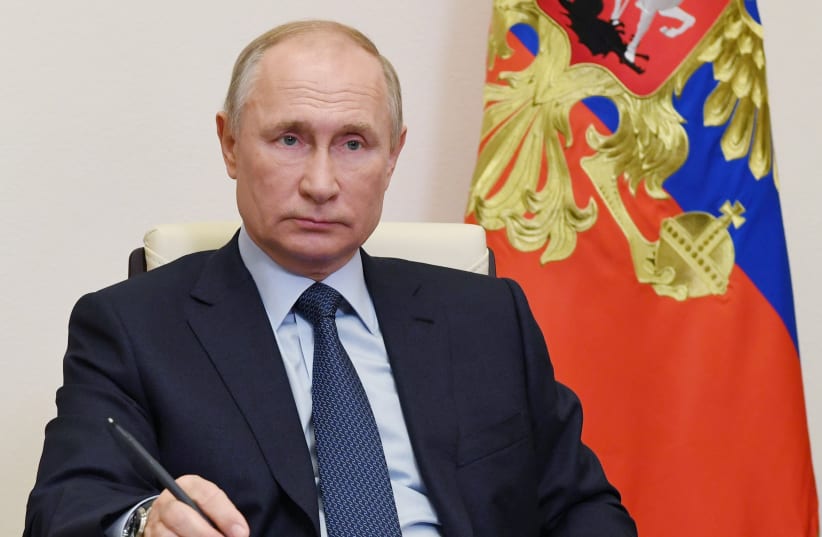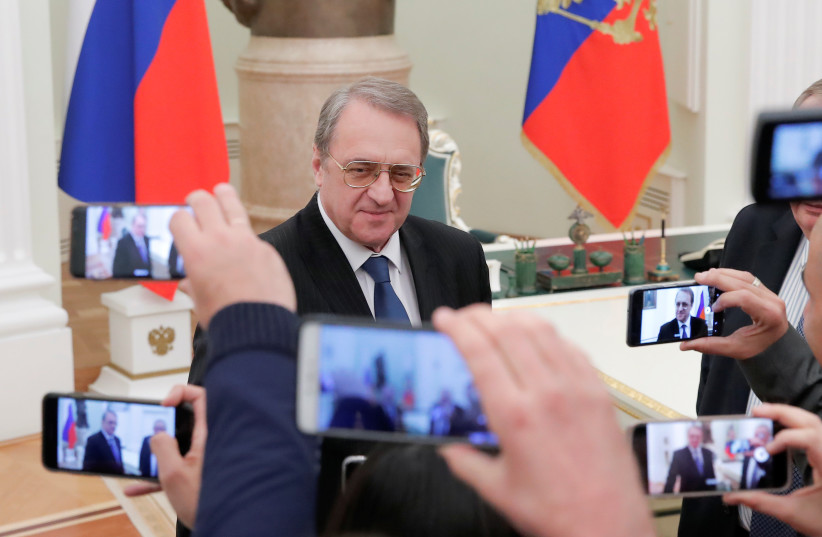The Russian Justice Ministry has requested the liquidation of the Jewish Agency for Israel’s activities in Russia, RIA Novosti News Agency reported Thursday. There will be a court discussion on the case next week, The Jerusalem Post has learned, and until then, the agency is trying to fight its case.
Senior sources in the Jewish Agency told the Post nothing has changed since the last report on the Russian request to close down the organization’s offices in Moscow, following an appeal the agency made to a Russian court.
“The information you have is inaccurate,” Jewish Agency spokeswoman Hagit Halali said Thursday. “A preliminary hearing has been scheduled for next Thursday on the matter, and this is the continuation of the legal proceedings. As we have said so far, we will not respond during the legal process.”
“The decision of the Justice Ministry to close the Agency hasn’t changed,” a source close to the agency said. “The Agency appealed to extend the time it has to save its operations in Russia.”
“The issue isn’t legal but rather political, and the decision will change only if the Israeli political and diplomatic leadership get their act together,” the source said.
A joint delegation from the Prime Minister’s Office and the Foreign, Justice and Aliyah and Integration ministries will be sent to Russia to ensure that the Jewish Agency can continue its operations, Prime Minister Yair Lapid said Thursday. Members of the delegation will mainly be legal advisers from the different ministries.
Even though these legal experts do not have a full understanding of the Russian justice system, they intend to show Moscow that the Israeli government is “serious” about its intentions to solve the issue, a government source said.
There will be another interministerial hearing on Sunday.
“The Jewish community in Russia is deeply connected to Israel, and its importance increases in any political conversation with the Russian leadership,” Lapid said. “We will continue to work through diplomatic channels so that the important activities of the Jewish Agency do not stop.”
Diplomatic sources told the Post there were a few serious problems with the way the Jewish Agency has managed the crisis.
“The attempt to punish the Jewish Agency for Israel’s position on the war is pathetic and insulting.
Nachman shai
“This is scandalous conduct by the agency,” one source said. “They haven’t updated the Foreign Ministry on this crisis, even though they’ve been integrated for the past few years. All that diplomatic officials heard about the issue with Russia’s Justice Ministry came from the Post instead of receiving updates from the agency.”
“Why wouldn’t the agency update the relevant government offices about the raids?” the source asked. “If they would have had meetings on the matter before the Russian-Ukrainian war, there might have been something to do.”
“Prime Minister Yair Lapid hasn’t taken this crisis seriously,” another official said Thursday. “He hasn’t held any meetings about this sensitive issue, which may cause the end of aliyah from Russia.”
The Post has learned, however, that Lapid did hold a few internal meetings and consultations on the matter of the agency in Russia.
Israeli politicians comment
Diaspora Affairs Minister Nachman Shai on Thursday expressed outrage at the move by the Russian Justice Ministry.
“Russian Jews will not be held hostage by the war in Ukraine,” he said. “The attempt to punish the Jewish Agency for Israel’s position on the war is pathetic and insulting. The Jews of Russia will not be detached from the historical and emotional connection to the State of Israel.”
Aliyah and Integration Minister Pnina Tamano-Shata said: “The immigration of Jews to Israel is a basic right that every Jew in the world has. The Jewish Agency’s activities take place all over Europe and in the rest of the continents, as well as in Russia, in full coordination with local authorities. Israeli diplomats have made efforts to clarify the issue and regulate the activities in coordination.”
“As the person responsible for the immigration of Jews and their absorption in Israel, I recently addressed Prime Minister Yair Lapid several times to hold a discussion at the political level, and I am in constant contact with Foreign Ministry Director-General Alon Ushpiz,” she said. “As we have worked in cooperation with the Russian authorities for many decades, I have no doubt that they will find the appropriate solutions.”
Lapid is expected to meet on Sunday with Tamano-Shata and Jewish Agency acting chairman Yaakov Hagoel. He has invited other ministers from the former USSR to participate, including Finance Minister Avigdor Liberman (who grew up in Moldova), Tourism Minister Yoel Razvozov (who grew up in Birobidzhan) and Housing and Construction Minister Ze’ev Elkin (who grew up in Ukraine).
Earlier on Thursday, Israeli Ambassador to Russia Alexander Ben-Zvi asked Moscow for clarifications after the Russian Justice Ministry took action against the Jewish Agency, an Israeli official confirmed Thursday.
The Russian Justice Ministry sent a letter to the Jewish Agency earlier this month, obtained exclusively by the Post, with a list of alleged violations of the law and their consequences. A senior Israeli diplomatic source said Russia had accused the Jewish Agency of illegally collecting information about Russian citizens.
In addition, in recent weeks, Russia expanded its definition of a foreign agent to include anyone who receives support from abroad and engages in actions that the authorities determine are against Russia’s national interest. That categorization could apply to the Jewish Agency or other Jewish organizations operating in Russia.
The Russian authorities’ actions could hinder the ability of Russian Jews to move to Israel.
Ben-Zvi met with Russian Deputy Foreign Minister Mikhail Bogdanov last week to ask about the steps taken against the Jewish Agency.
Bogdanov said the actions were not meant to be diplomatic moves against Israel and that he would look into the matter. The meeting was first reported by Walla.
The Prime Minister’s Office has been trying to coordinate a response among the various government bodies and the Jewish Agency.
The sense in Jerusalem, especially in light of Bogdanov’s assurances that the matter is not political, was that the Jewish Agency is not being targeted, but that it has fallen under an ongoing Russian crackdown on Western NGOs in general, according to people familiar with the matter.
At the same time, a lack of clarity remains, and the Israeli government is still seeking answers from Moscow.
The crackdown on the Jewish Agency came since Lapid, who has been vocally critical of Russia’s invasion of Ukraine, became prime minister.
Israel’s policy on Ukraine has not changed under Lapid. Jerusalem has not sent any military aid to Kyiv, but only humanitarian aid, out of a concern it could jeopardize the deconfliction mechanism with Russia that allows Israel to strike Iranian targets in Syria.

